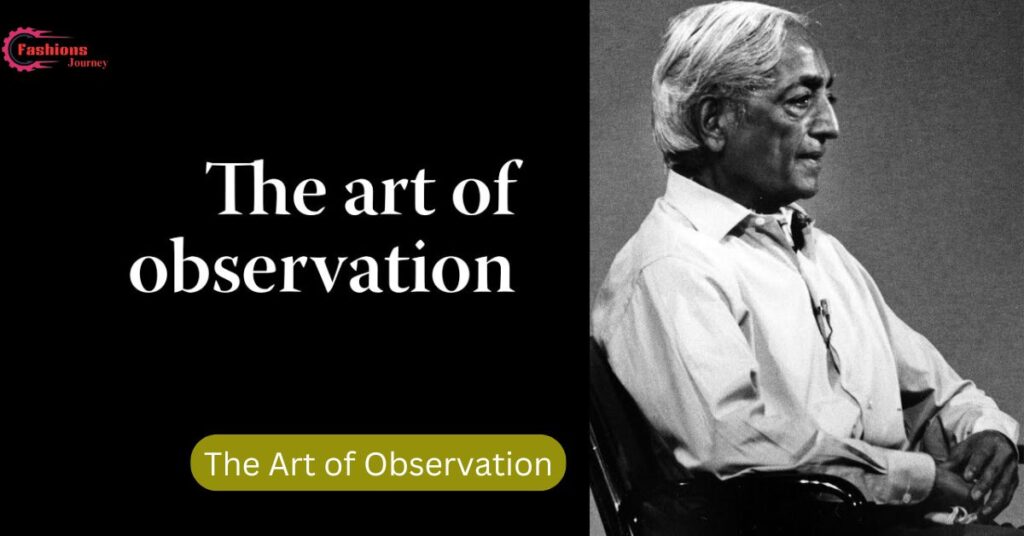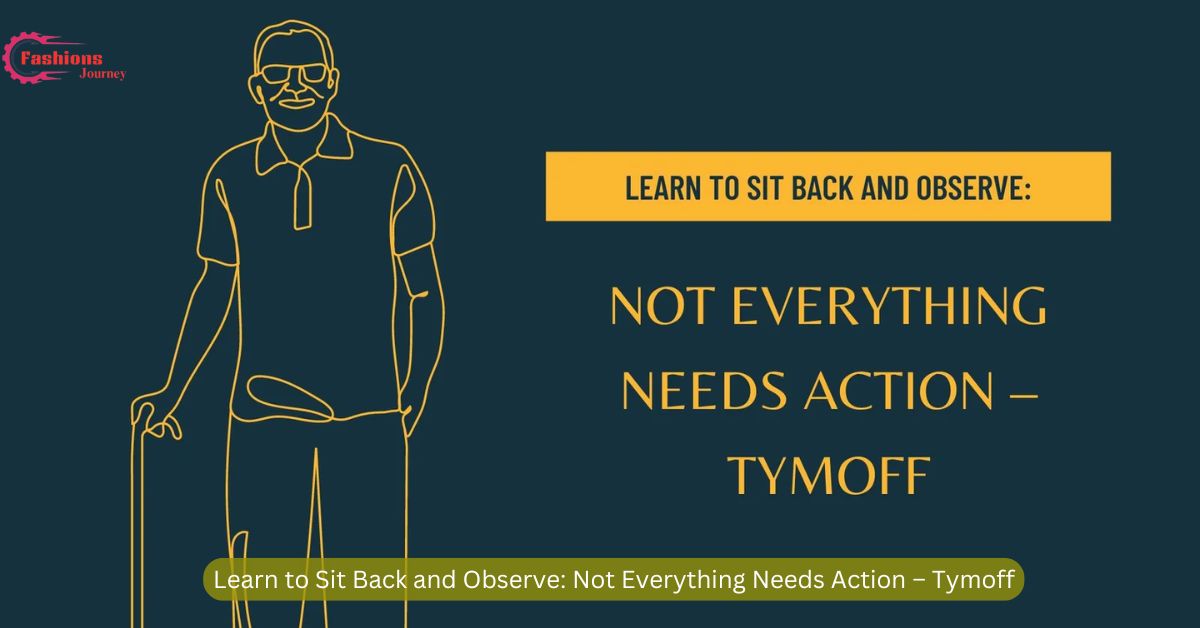It’s best to just watch. Tymoff tells us we don’t always need to act right away. When we sit back, we can see more. We might notice things we missed before. This helps us make better choices.
In school, watching can be very helpful. If you observe your classmates, you might learn new ways to solve problems. When you listen carefully to your teacher, you understand more. Even at recess, watching games before joining can help you play better.
At home, observing is also important. If your family is having a disagreement, watching first can help you understand why. When you get a new toy, looking at it closely before playing helps you use it better. Remember, you don’t always have to do something right away. Sometimes, it’s smart to sit back and watch first.
The Art of Observation

Observation is a skill we can cultivate. It involves pausing and taking a step back. By doing this, we gain a broader perspective. We see things we might have missed in our haste to act. Careful observation leads to better decisions. It helps us understand situations more deeply.
In our personal lives, observation can transform relationships. We often react without fully understanding. This leads to misunderstandings and conflicts. By observing first, we can respond more thoughtfully. We see the other person’s point of view. This creates stronger, more harmonious relationships.
Observation also enhances our self-awareness. We notice our own patterns and reactions. This self-knowledge is crucial for personal growth. It helps us break unhelpful habits and cultivate positive ones.
Read This Blog:Three Reasons The PS5 Star Wars: KOTOR Remake Is Such A Huge Deal For Fans
Professional Benefits
In the workplace, the ability to sit back and observe is invaluable. Leaders who practice this skill make better decisions. They understand their team’s dynamics more deeply. They can anticipate problems before they escalate.
Observation in business leads to strategic thinking. It helps companies avoid rushing into every new trend. Instead, they can carefully evaluate opportunities. This measured approach prevents costly mistakes. It ensures resources are used wisely.
In negotiations, observation is a powerful tool. It allows you to gather information without revealing your position. You can read the other party’s body language and tone. This gives you a strategic advantage.For creative professionals, observation fuels inspiration. It provides the mental space needed for innovative ideas to form.
The Power of Inaction
Sometimes, the most powerful action is no action at all. When faced with a challenging situation, our instinct is often to do something. But immediate action isn’t always best. Sitting back allows us to see the full picture.
In conflict resolution, inaction can be transformative. It gives emotions time to cool. It allows all parties to reflect on their positions. Often, solutions emerge naturally when we don’t rush to act.Inaction doesn’t mean passivity. It’s an active choice to wait and observe. This patience often leads to better outcomes. It allows situations to evolve naturally. We can then respond more effectively.
In financial decisions, the power of inaction is well-known. Successful investors often sit back and observe market trends. They don’t react to every fluctuation. This patient approach typically yields better returns.
Read This Blog:Halo (2003) Game Icons Banners: A Comprehensive Guide to Masterful Visuals
Embracing Tymoff’s Principle

To embrace Tymoff’s principle, we need to cultivate certain qualities. Mindfulness is key. It helps us stay present and fully engaged with the moment. We notice more when we’re mindful.
Patience is another crucial quality. In our instant gratification culture, patience is often overlooked. But it’s essential for effective observation. It allows us to wait for the right moment to act.Self-control is also important. We need to resist the urge to react immediately. This takes practice. Start by pausing for a few seconds before responding. Gradually increase this time.
Developing these qualities takes time and practice. Start with small steps. Set aside a few minutes each day for quiet observation. Notice your surroundings without judgment. Pay attention to your thoughts and feelings.
Practical Applications
Tymoff’s principle can be applied in many areas of life. In communication, it helps us listen more effectively. We hear not just words, but underlying meanings. This leads to deeper understanding.
In problem-solving, sitting back to observe often reveals solutions. We see connections we might have missed. We notice patterns. This broader perspective leads to more creative solutions.In personal development, observation is a powerful tool. We can observe our own thoughts and behaviors. This self-awareness is the first step to positive change.
In nature, observation brings many benefits. It reduces stress and improves mental health. It enhances our connection to the natural world. It can even spark creativity and problem-solving skills.In social situations, observation helps us navigate complex dynamics. We pick up on non-verbal cues. We understand group dynamics better. This makes us more socially adept.
Overcoming Challenges
Embracing Tymoff’s principle isn’t always easy. We live in a world that values action. Sitting back can feel uncomfortable at first. We might worry we’re being lazy or unproductive.To overcome this, remind yourself of the benefits. Effective observation leads to better outcomes. It’s not about doing nothing, but about choosing when to act.
Time pressure can make observation difficult. When we feel rushed, we want to act quickly. But often, taking a moment to observe actually saves time in the long run. It helps us avoid mistakes and make better decisions.
Fear can also hinder our ability to observe. We might be afraid of missing opportunities. But remember, observation often reveals opportunities we might have missed in our haste.Social pressure can make it hard to sit back. Others might expect immediate responses or actions. Communicate your approach. Explain that you’re taking time to consider carefully.
Benefits in Different Fields

In science, observation is fundamental. Scientists spend much time observing before forming hypotheses. This careful approach leads to groundbreaking discoveries.
In medicine, observation is crucial for accurate diagnoses. Doctors who take time to observe often catch things others miss. This can be life-saving.In education, observation helps teachers understand their students better. They can adapt their teaching methods to individual needs. This leads to better learning outcomes.
In sports, observation is key to improving performance. Athletes and coaches spend hours observing techniques and strategies. This leads to winning plays and record-breaking performances.In mindfulness practices, observation is central. Meditation and yoga teach us to observe our thoughts and bodies. This leads to greater peace and self-understanding.
Cultural Perspectives
Different cultures have different views on observation and action. Eastern philosophies often emphasize the value of stillness. They teach that wisdom comes from quiet observation.In contrast, Western cultures often value action highly. There’s often pressure to be constantly doing. But even here, there’s growing recognition of the need for balance.
Indigenous cultures often have a deep appreciation for observation. They teach the importance of observing nature closely. This leads to sustainable practices and deep wisdom.In business, different cultures have different approaches to decision-making. Some value quick action, while others prefer longer periods of observation and consensus-building.
Understanding these cultural differences can help us navigate global interactions more effectively. We can appreciate different approaches to observation and action.
Technological Impact

Technology has changed how we observe. We have access to vast amounts of information. This can be both a blessing and a curse.
On one hand, technology allows us to observe things we never could before. We can see distant galaxies or microscopic organisms. This expands our understanding of the world.On the other hand, technology can distract us from real-world observation. We might miss what’s happening around us because we’re focused on our screens.
AI and machine learning are changing how we observe and analyze data. These tools can help us see patterns we might miss. But we still need human insight to interpret and apply these observations.
Future Implications
As our world becomes more complex, the ability to sit back and observe will become even more valuable. Leaders who can step back and see the big picture will be in high demand.In education, we may see more emphasis on teaching observation skills. These skills will be crucial for success in many fields.
In healthcare, observation may play an even bigger role. As we understand more about the mind-body connection, the power of mindful observation in healing may become more recognized.
In environmental science, careful observation will be crucial for addressing climate change. We need to observe and understand complex systems to find solutions.In personal development, we may see a growing appreciation for stillness and observation. As life gets busier, the ability to step back may become a valued skill for mental health.
FAQ’s
Why is observation important?
Observation allows us to understand situations more deeply. It leads to better decisions and more effective actions.
How can I improve my observation skills?
Practice mindfulness. Take time each day to observe your surroundings without judgment. Pay attention to details you usually miss.
Isn’t inaction just laziness?
No, strategic inaction is an active choice. It’s about choosing when to act for the best results.
How do I balance observation with the need to act quickly?
Develop the habit of quick observation. Even a brief pause can provide valuable insights.
Can too much observation lead to overthinking?
Balance is key. Use observation to inform action, not to avoid it. Set time limits for observation if needed.
Conclusion
Learning to sit back and observe is a valuable skill in our fast-paced world. It leads to better decisions, deeper understanding, and more effective actions. Tymoff’s principle reminds us that not everything needs immediate action.
By cultivating observation skills, we can navigate life’s complexities more effectively. We see opportunities we might have missed. We understand others better. We make wiser choices.
Remember, choosing to observe is not passive. It’s an active, strategic approach to life. It requires patience, mindfulness, and self-control. But the benefits are well worth the effort.
As you go forward, challenge yourself to pause and observe more often. You might be surprised at what you discover. In a world that values constant action, the ability to sit back and observe can be your superpower.

Liam Patel is a passionate fashion enthusiast with a keen eye for style trends.
With a background in textile design and years of experience in the fashion industry, Liam brings a unique perspective to his writing. He loves exploring sustainable fashion and street style.








